 Petzlover
Petzlover Finnish Hound is originated from Finland but Schnorkie is originated from United States. Finnish Hound may grow 32 cm / 13 inches higher than Schnorkie. Finnish Hound may weigh 19 kg / 42 pounds more than Schnorkie. Finnish Hound may live 3 years less than Schnorkie. Both Finnish Hound and Schnorkie has almost same litter size. Finnish Hound requires Low Maintenance. But Schnorkie requires Moderate Maintenance
Finnish Hound is originated from Finland but Schnorkie is originated from United States. Finnish Hound may grow 32 cm / 13 inches higher than Schnorkie. Finnish Hound may weigh 19 kg / 42 pounds more than Schnorkie. Finnish Hound may live 3 years less than Schnorkie. Both Finnish Hound and Schnorkie has almost same litter size. Finnish Hound requires Low Maintenance. But Schnorkie requires Moderate Maintenance
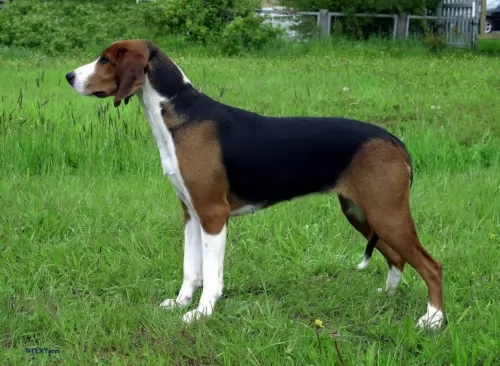 As one of Finland’s most popular dogs, the Finnish Hound isn’t particularly well known outside of Finnish borders. Known also as the Finsk Stovare, the Finnish Hound, known for its hunting skills, came about because of a breeding effort which started way back in the 1800s, mixing dogs such as different French, Swedish, and German hounds.
As one of Finland’s most popular dogs, the Finnish Hound isn’t particularly well known outside of Finnish borders. Known also as the Finsk Stovare, the Finnish Hound, known for its hunting skills, came about because of a breeding effort which started way back in the 1800s, mixing dogs such as different French, Swedish, and German hounds.
These hounds were used with the idea being to develop a dog that could do well in Finland’s terrain. The Finnish Hound is a great hunting dog but isn’t looked upon as an particularly awesome pet, although some pet owners would beg to differ.
 This dog is a cross between the Miniature Schnauzer and the Yorkshire Terrier.
This dog is a cross between the Miniature Schnauzer and the Yorkshire Terrier.
It’s not a purebred dog and is known as a designer dog. These dogs inherit characteristics from both of its purebred parents.
The origins and history of these breeds is often unknown with their being no records as to when or where breeders started developing them. This particular mixed breed dog originated in the United States.
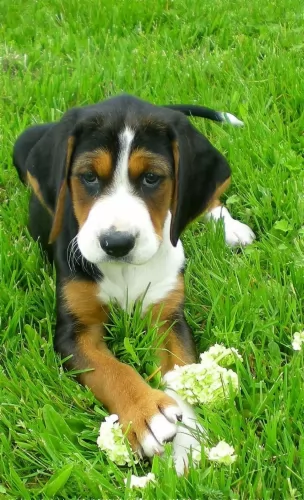 This is a medium sized dog who stands between 52 – 62cm in height and weighs in at 20 to 25kg. The Finnish Hound can have between 4 – 8 puppies.As a scent-hound, the Finnish Hound has a short, smooth double coat which is usually in a tri-color pattern of black, tan, and white.
This is a medium sized dog who stands between 52 – 62cm in height and weighs in at 20 to 25kg. The Finnish Hound can have between 4 – 8 puppies.As a scent-hound, the Finnish Hound has a short, smooth double coat which is usually in a tri-color pattern of black, tan, and white.
The attractive dog has an athletic, lean, muscular body full of energy and stamina. The eyes are brown and the dog has a peaceful expression. The medium length ears are floppy and the tail is long and carried low.
The Finnish Hound is friendly, calm and never aggressive. He is an intelligent dog nd will respond to the training and socialization he will require to turn him into an obedient, amicable pet, especially since he tends to be stubbon, independent and strong-willed. He isn’t recommended for small places in the city but will do better in the country with a fairy large piece of ground. The Finnish Hound is not recommended for apartment life. It is moderately active indoors and does best with at least an average-sized yard.
 The Schnorkie is a small dog standing at between 12 to 30cm in height and weighing just 3 to 6kg.
The Schnorkie is a small dog standing at between 12 to 30cm in height and weighing just 3 to 6kg.
Schnorkies have an athletic build but they are lean and you want to keep them that way.
Their double coat is mostly silky and straight, but can be wavy too. The double coat can be grey, silver, fawnish and have a mix of colors while also being available in solid colors.
The ears are half erect, half floppy and the tail tends to be medium length, plumed and held up.
Schnorkies are high spirited little dogs and they can also prove to stubborn. There is nothing that a bit of training and socialization won't do for stubborn dogs, making them obedient and responsive to their owners.
Because they are hybrid dogs, they can inherit temperaments or looks from either of the parent dogs.
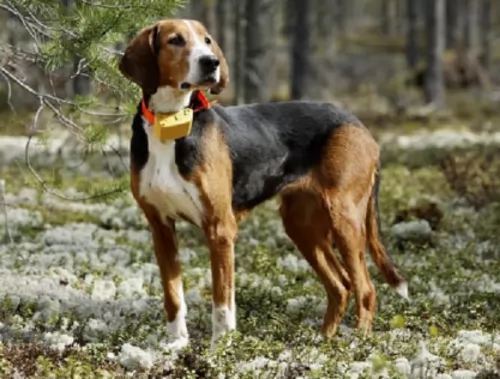 The Finnish Hound has always been a working dog and so he will require being well exercised.
The Finnish Hound has always been a working dog and so he will require being well exercised.
He makes a good pet with homes where there are other dogs as well as children. As a hunting or working dog, these days the Finnish Hound is also regarded as a companion animal, fitting into family life well, and turning out to be a loving, loyal pet.
 Your Schnorkie is a jaunty little dog who is going to love playing games with you. Children will need to treat him with gentleness and respect simply because he is small.
Your Schnorkie is a jaunty little dog who is going to love playing games with you. Children will need to treat him with gentleness and respect simply because he is small.
He is social, friendly and loving with his human family, though sometimes, coming from the Schnauzer, he gets a bit moody.
He makes a great family pet though and and while he loves to be outside playing, he also loves to come indoors and be everybody’s lap dog for the evening.
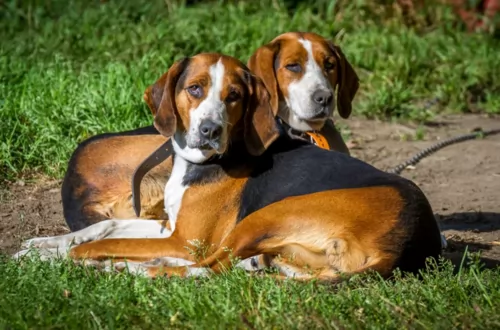 The Finnish Hound is looked upon as a generally healthy breed who can get to 12 years of age if looked after well. Good nutrition plays a huge role towards excellent health.
The Finnish Hound is looked upon as a generally healthy breed who can get to 12 years of age if looked after well. Good nutrition plays a huge role towards excellent health.
Check out common health ailments that can affect most dogs such as dental disease, obesity, hip dysplasia and a serious condition for which these dogs are particularly known – cerebellar ataxia. Lesions in the brain affect the dog’s coordination and sight. Get him to the vet as soon as you detect anything unusual with your pet.
 Your Schnorkie, as a hybrid breed, can inherit some health problems from either parent – the Schnauzer or the Yorkshire Terrier.
Your Schnorkie, as a hybrid breed, can inherit some health problems from either parent – the Schnauzer or the Yorkshire Terrier.
Then again, mixing pure bred dogs can eliminate some common dog ailments. Overall, the Schnorkie is a healthy dog and can live up to 15 years of age.
A couple of major health concerns with the Schnorkie are dental problems and pancreatitis.
If your dog has tooth problems he might be in terrible pain and that is why it is so important to look inside his mouth.
Dogs can break their teeth and they can also get gum disease. Dogs have a more alkaline mouth and this is what encourages plaque. Try and brush your pet’s teeth with special canine toothpaste and toothbrush because dental disease can cause lots of problems for your pet.
The pancreas helps with the digestion of food and to regulate blood sugar. Pancreatitis is more common in Schnauzers, and then the pancreas is swollen and inflamed.
Dogs with this disease will lose their appetite, be lethargic, restless and have stomach pain. You may see your pet hunching his back. Pancreatitis can lead to organ damage and you will need to get your dog to the vet.
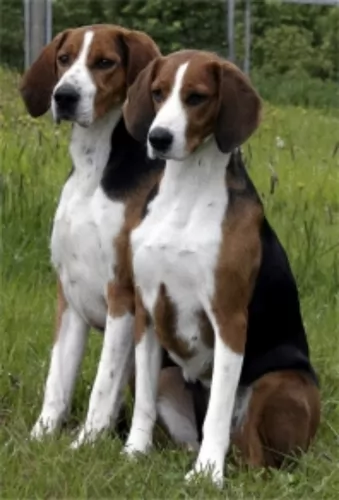 As a medium-sized dog breed, you want to make sure to feed your dog a high-quality commercial dog food – one that has been formulated with the right amount of vitamins and minerals for the type of dog he is.
As a medium-sized dog breed, you want to make sure to feed your dog a high-quality commercial dog food – one that has been formulated with the right amount of vitamins and minerals for the type of dog he is.
He is a high-energy hunting breed, so you wan to find a food that is appropriate to his needs. Home cooked brown rice, vegetables and chicken can be added into his kibble as a change and a treat from time to time as well as some raw meat occasionally. Make sure he always has access to fresh, cool water.
Physically active and mentally balanced and intelligent, the Finnish Hound will require both physical and mental stimulation to prevent him from becoming bored and frustrated.
As an average shedder, your pet's smooth, short-haired coat is easy to keep in tip top condition. All that is really required is to brush the coat down twice a week to keep it in peak condition.
Don’t neglect to check the inside of the dogs ears, as too much dirt and wax can cause nasty ear infections. Also, the teeth need to be brushed at least 2 or 3 times a week with special canine toothpaste and toothbrush. This will ward off tooth decay and lots of other problems within the body brought about by bad teeth.
 Puppies will need 4 small meals a day, but by 8 weeks your Schnorkie will be ready to move onto dry dog food. As he grows into an adult you will cut the meals down to two a day.
Puppies will need 4 small meals a day, but by 8 weeks your Schnorkie will be ready to move onto dry dog food. As he grows into an adult you will cut the meals down to two a day.
The best commercially manufactured dry dog food is able to meet your dogs nutritional needs and it’s super convenient too. It can be a good idea to feed your pet some home-made food too. Twice a week will be sufficient to add in this home-made food - boiled chicken, brown rice or pasta, sweet potatoes, carrots and spinach will be excellent for him and his digestion and be a tasty treat for him. You can simply chop it up and add it to the dry kibble. Some raw meat occasionally can help to ward off nasty skin ailments. Make sure that your Schnorkie has a constant supply of cool fresh water.
Schnauzers and Yorkies both have high maintenance coats and your Schnorkie will also require regular brushing, though he doesn’t shed much. Some people prefer to hand their dogs in and have them professionally groomed.
Just because a Schnorkie is a little dog, doesn’t mean he doesn’t need exercise. You don’t want a small dog like this getting obese and unfit. Take him for walks and give him some ball games.